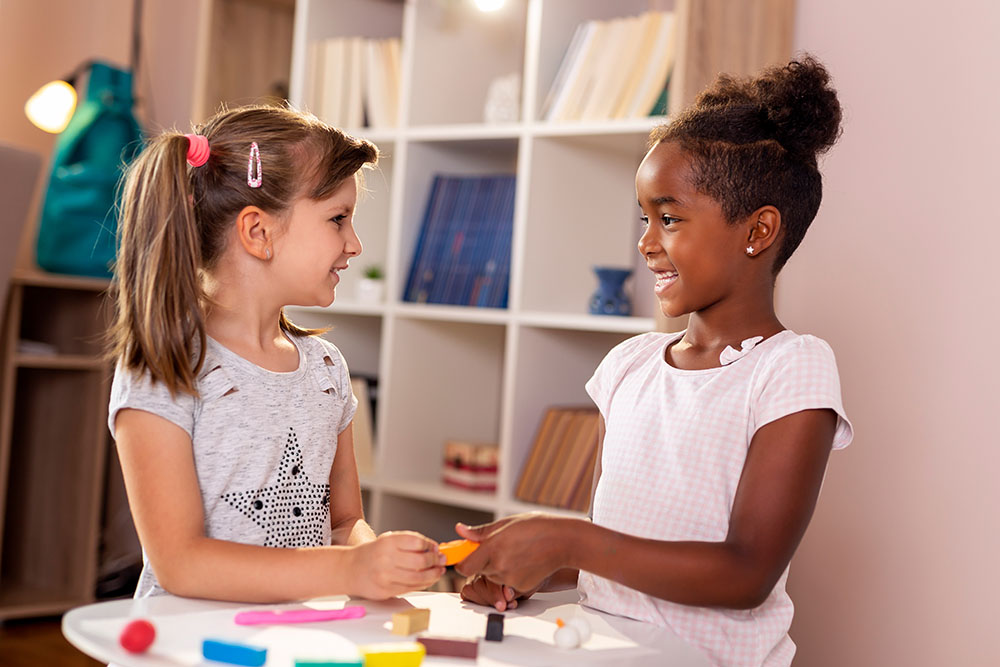Social and Emotional Learning Impacts Kids Far Beyond the Classroom

by Taryn Givan
Over the last 20 years, the school experience has continued to evolve from traditional teaching methods to more student-centered approaches within collaborative classroom structures. This shift has greatly impacted how students interact with one another on a daily basis not only in the classroom setting, but also within the campus setting.
Students of all ages are often found developing (and revisiting) social norms as a class that are intended to guide the learning experience as individuals and a collective unit. In today’s educational landscape, students contribute to making our communities a place that embraces diversity of thought, feelings and experiences in addition to racial and gender identities. Social and emotional learning provides the fundamentals to assist students (and adults) with the aforementioned reality.
Studies show that SEL can have a positive impact on a student’s academics, relationships, mental health and more.
When I was a pre-kindergarten administrator, we used the Conscious Discipline methodology in which our three- and four-year-olds were empowered with the language to acknowledge their feelings and express them to others in appropriate ways. As I walked the campus daily, I was impressed with how this approach shaped the day-to-day interactions of our youngest leaders. The use of I statements to indicate personal preferences such as, “I don’t like it when you [touch my hair], please stop,” taught boundaries and helped them establish character.
When I transitioned as a principal to the upper elementary grades, our campus had adopted The 7 Habits of Happy Kids: Leader in Me by Stephen R. Covey. This program specifically addressed the necessary skills of leadership and accountability from an individual perspective to being one of the team and learning how to synergize and think win-win with others.
Whether your child’s school has a targeted social and emotional learning program or SEL is embedded within the curriculum, it is vital to understand and incorporate the principles at home.
The five SEL competencies from the Collaborative for Academic, Social, and Emotional Learning framework are:
- Self-Awareness: The ability to recognize and name personal emotions. It also includes the ability to understand your own needs, as well as your strengths and limitations. This awareness of self is crucial to early school success.
- Self-Management: The ability to regulate emotions and behaviors so that goals are achieved. It also involves persevering with difficult tasks and in complex social interactions.
- Social Awareness: The ability to understand what others are feeling and have the understanding to take their perspective. Theory of mind is the ability to understand how different beliefs, motivations, moods, and levels of knowledge affect our own behavior as well as the behavior of those around us.
- Relationship Skills: To be successful in school, children need to be able to form positive social relationships, work together, and deal effectively with conflict. Children who enjoy positive relationships with peers experience higher levels of emotional well-being and have self-beliefs that are stronger and more adaptive than children without positive peer relationships.
- Responsible Decision-Making: When young children learn to make positive choices about their personal and social behavior, they are making responsible decisions. Focus in the classroom and school community needs to be placed on problem-solving, reflection, perceptive thinking, self-direction, and motivation skills that will contribute to lifelong success (Adams and Hamm 1994).
This combination of intrapersonal and interpersonal skills impacts all settings: home, school, and community. One of the best ways to discuss social and emotional learning in your home is to incorporate check-ins. Question stems like those below can be used to gauge which of the CASEL competencies to help your child develop.
- How are you feeling today?
- What has been the best part of your week?
- What has been the toughest part of your week?
- Did you feel included in class and school this week?
- How did you help a classmate or friend this week?
To hear real stories from real families and access additional social and emotional learning resources, visit leadingwithsel.org/parent-caregiver/.
About the Author: Taryn Chambers Givan, a native of Texarkana, Texas, is the Founder & CEO of Divergent Educational Consulting, LLC and Manager of Learning & Development-1:1 Services and Instructional Coach with BetterLesson. She is in her 22nd year as an educator and is the blessed wife of Antonio, mother of Endyia and bonus mom to Breylon and Ashton. Taryn can be reached at divergenteducationalconsulting.com.









